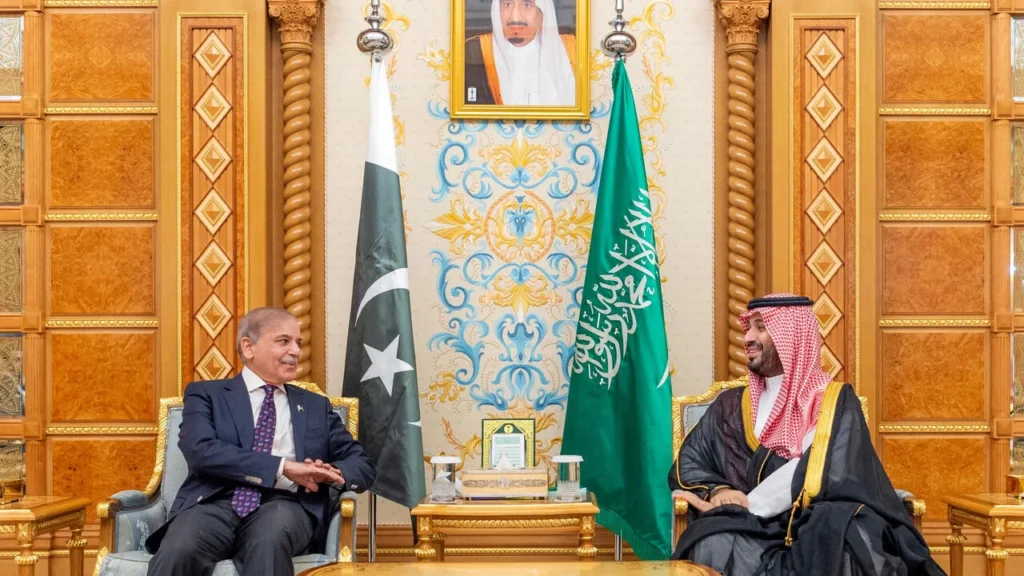In a landmark move that signals a new chapter in regional economic diplomacy, Pakistan and Saudi Arabia have launched a $6 billion Economic Cooperation Framework aimed at revitalizing bilateral ties and supporting Pakistan’s economic recovery. The announcement came during the Future Investment Initiative in Riyadh on October 27, 2025, where Prime Minister Muhammad Shehbaz Sharif met with Saudi Crown Prince Mohammed bin Salman to formalize the agreement. This development not only strengthens trade and investment relations but also reinforces both nations’ shared commitment to regional stability and long-term strategic alignment.
Pakistan and Saudi Arabia: A Partnership Anchored in Mutual Interests
The $6 billion support package includes $1 billion in oil financing facilities and $5 billion in deposit rollovers, providing Pakistan with critical fiscal breathing room amid ongoing economic challenges. This financial infusion builds upon a recent defense pact signed between the two countries, reflecting a broader convergence of strategic interests. For Pakistan, the framework offers a lifeline to stabilize foreign reserves and reduce pressure on its balance of payments. For Saudi Arabia, it aligns with Vision 2030, the Kingdom’s ambitious roadmap to diversify its economy and expand its geopolitical influence through targeted investments in key regional partners.
Strategic Timing and Symbolism
The timing of this agreement is significant. Pakistan is navigating a complex economic landscape marked by inflation, debt servicing pressures, and energy shortages. The Saudi support package arrives as a vote of confidence in Pakistan’s reform agenda and its potential to emerge as a regional economic hub. For Saudi Arabia, deepening ties with Pakistan enhances its influence in South Asia and strengthens its role as a stabilizing force in the Muslim world. The Future Investment Initiative served as a symbolic platform to showcase this evolving partnership to global investors and policymakers.
Expanding the Scope: Beyond Finance
While the headline figure of $6 billion is substantial, the framework’s true value lies in its multidimensional scope. It includes collaboration in energy, infrastructure, agriculture, and technology sectors critical to Pakistan’s long-term growth. Joint ventures in renewable energy and oil refining are already under discussion, with Saudi companies exploring opportunities in Pakistan’s Special Economic Zones. This diversification of cooperation reflects a shift from transactional aid to strategic investment, positioning both countries as co-architects of regional development.
A Model for Regional Stability
The Pakistan and Saudi Arabia partnership also carries implications for broader regional stability. As Afghanistan, Iran, and Central Asian states grapple with political and economic uncertainty, a strong Pakistan-Saudi axis could serve as a counterbalance, promoting connectivity, trade corridors, and counterterrorism cooperation. The defense pact signed earlier this year complements the economic framework, signaling a holistic approach to security and development. This dual-track engagement enhances Pakistan’s strategic relevance and offers Saudi Arabia a reliable partner in a volatile region.
Challenges and the Road Ahead
Despite the optimism, challenges remain. Pakistan must ensure transparency and efficiency in utilizing the support package, while Saudi Arabia will expect measurable returns on its investments. Both nations must navigate bureaucratic hurdles, regulatory reforms, and geopolitical sensitivities to fully realize the framework’s potential. However, the political will demonstrated in Riyadh suggests a shared determination to overcome these obstacles.
Conclusion
The launch of the Economic Cooperation Framework marks more than a financial transaction; it represents a strategic reset in Pakistan and Saudi Arabia relations. It reflects a maturing partnership rooted in mutual respect, shared goals, and a vision for regional prosperity. As both nations move forward, this framework could become a blueprint for future collaborations, anchored not just in aid but in ambition. For Pakistan, it offers hope and opportunity; for Saudi Arabia, it reinforces its role as a regional powerhouse. Together, they are charting a path toward economic resilience and geopolitical relevance in a rapidly changing world.
Also Read: Mutual Defence Pact: Pakistan and Saudi Arabia are Reshaping the Muslim World Order


